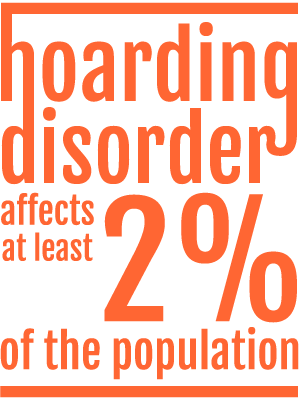Getting Hoarding in Order

It’s stories like that of Lifeline Harbour to Hawkesbury (Lifeline H2H) and its hoarding treatment program that show the passion and ingenuity of those who work in the mental health community.
Last October, WayAhead celebrated another rewarding month dedicated to the mental health community with the 2015 Mental Health Matters Awards. Each award winner comes with its own little story of how they got to where they are today, and Lifeline H2H is no exception, making a huge stride in the mental health community.
 Lifeline H2H, a co-winner with The Mindspot Clinic, won the Mental Health Award for Excellence in Service Delivery for its development of a hoarding treatment program. The organisation took the studies that were initiated and developed this treatment program based off a model in the United States, tweaking it to suit the local community in Sydney.
Lifeline H2H, a co-winner with The Mindspot Clinic, won the Mental Health Award for Excellence in Service Delivery for its development of a hoarding treatment program. The organisation took the studies that were initiated and developed this treatment program based off a model in the United States, tweaking it to suit the local community in Sydney.
While there have been many reports of it throughout history, hoarding disorder is only a recent addition in the Diagnostic and Statistical Manual for mental health as a standalone disorder. Prior to 2014, it was grouped with obsessive compulsive disorder (OCD).
Six years ago, the Willoughby City Council paved the way for the development of the treatment program. The council had dealt with the cleanups and legal costs of several properties, which was seen as an expensive, short-term solution to an ongoing, progressive problem. It wasn’t until council member for Dougherty Community Services Group, Louise Geaghan, realised there was an underlying issue that longer term change was to occur.
It was by chance that Ms Geaghan had studied for an honours degree in psychology because it allowed her to realise the hoarding behaviours were not going to resolve itself; you have to address it at the roots. Then Willoughby City Council had to deal with another cleanup – but this time it was different. The owner had asked for more time to sort the home out, but before the council heard from him again, he had already committed suicide.
This prompted Willoughby City Council to approach Macquarie University to pilot this study into a treatment program in partnership with Lifeline H2H.
“Every council has had an awareness and an ongoing interaction with people who hoard in their homes, mainly because of the level of materials that go beyond their house, then neighbours start to complain to the council and council has to find a way to satisfy everyone,” Ms Geaghan says.
Based on the self-help book, Buried in Treasures by David Tonlin, Randy Frost and Gail Steketee, the treatment program generally runs weekly sessions for 15 weeks, with an additional 13-week support group. The program is very educational and focuses on spending time with the participants to try and understand the disorder, why it has developed and the barriers to overcoming it. The other component of the program is based around motivation, where participants work on their decision-making and organisational skills. They are also encouraged to set goals and make predictions about what would happen if they discarded something.
“They practice discarding unneeded possessions and challenge problematic beliefs about possessions, such as if they discard it, it will be catastrophic and they can’t survive without it or that possessions make them feel safe and they have trouble discarding things to the point where they can’t use their homes, can’t sleep in their beds, can’t use their kitchens,” says Dr Jessica Grisham, who supervised the development of the treatment program.
The program aims to help participants make changes in their way of thinking, to be able to let go of their attachments to things and to create space in their homes. Some participants have not had guests in their homes for years due to the embarrassment of the state of their homes.
Since Grace* completed the treatment program, she has started to make changes within her own life.
“I’m very aware of how things can build up slowly over time and once you put something down, you’ll think that you can fix it tomorrow and then you run out of steam. But, when you have a hoarding disorder it impinges on your energy because everywhere you look, you’re living amongst chaos, so that zaps your energy,” she says.
*Name has been changed.
Lifeline Harbour to Hawkesbury – 2015 Mental Health Matters Excellence in Service Award co-winner
Written by Cindee Duong
Newsletter
Stay up to date
Sign up to our Mind Reader newsletter for monthly mental health news, information and updates.